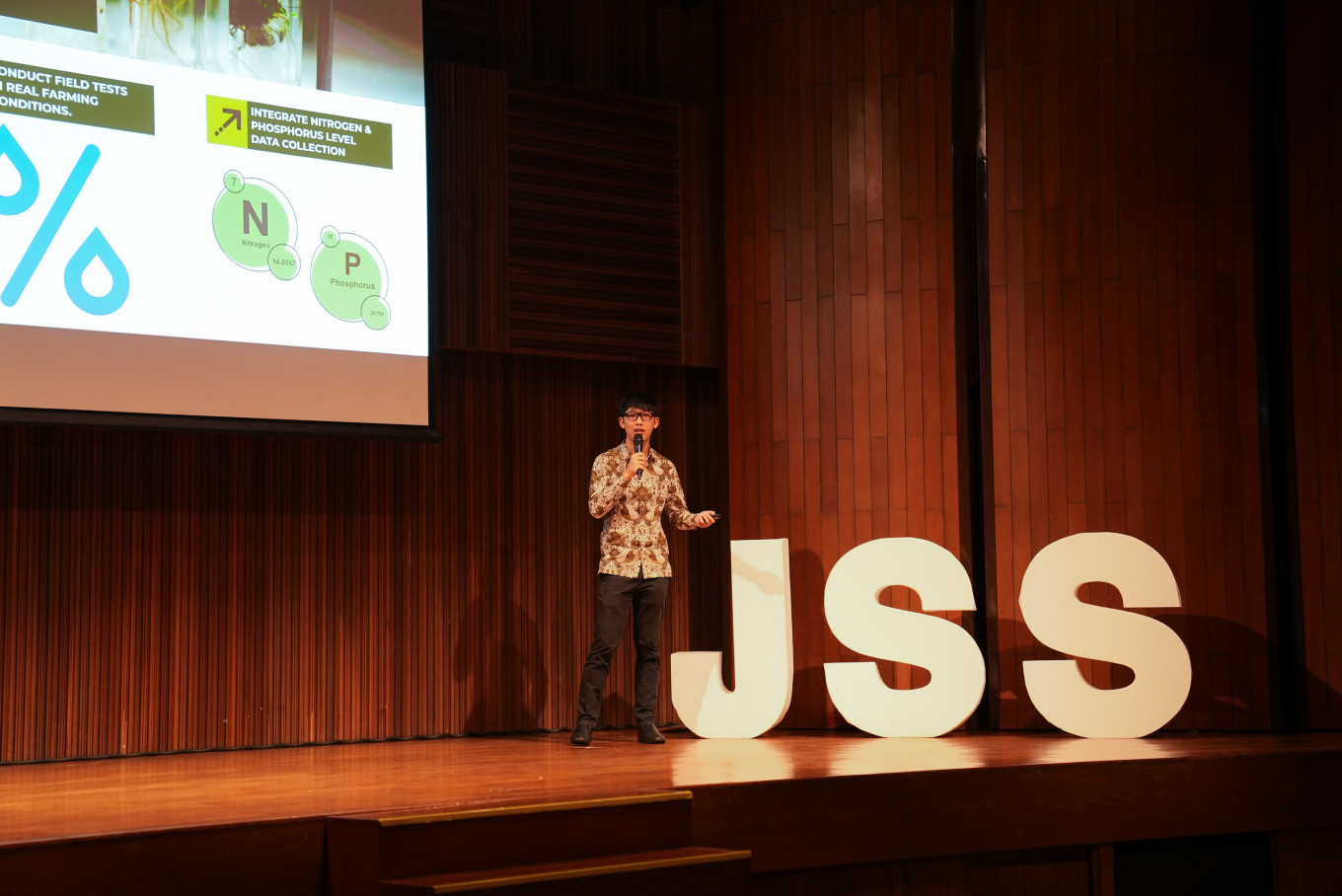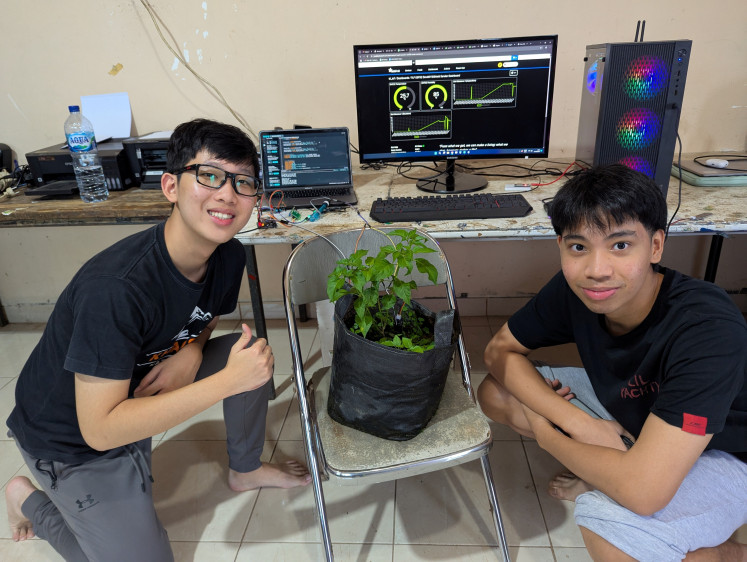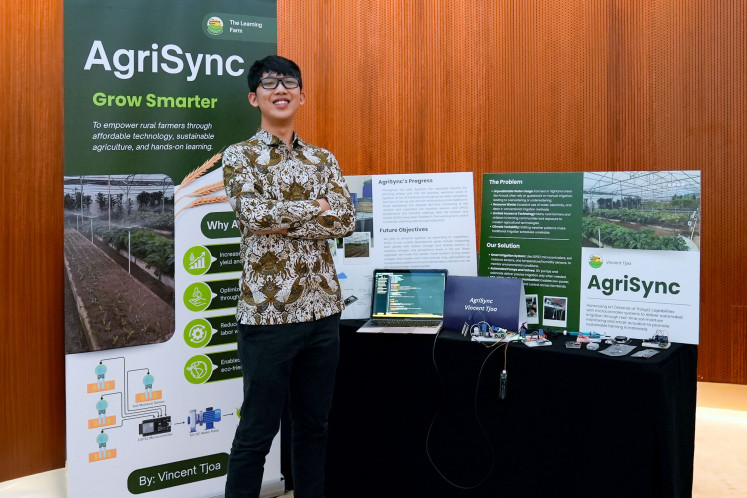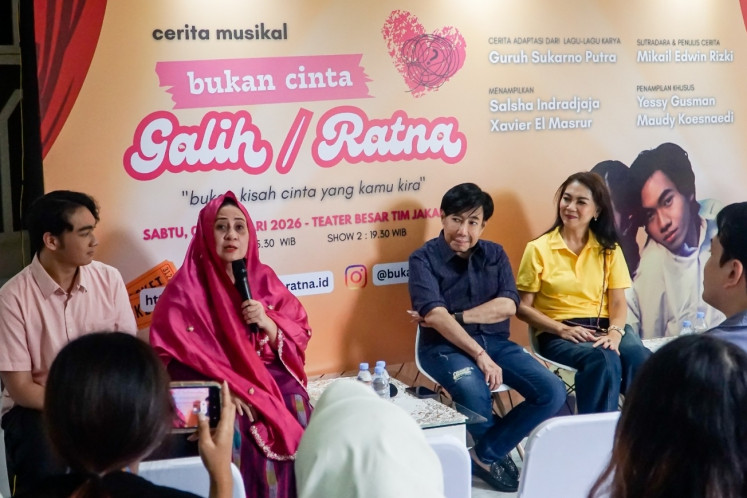Popular Reads
Top Results
Can't find what you're looking for?
View all search resultsPopular Reads
Top Results
Can't find what you're looking for?
View all search resultsGrade 11 student emphasizes impact of technology on agricultural water conservation
Change text size
Gift Premium Articles
to Anyone
T
he Jakarta Scholar Symposium, or JSS is an independent, non-profit coalition dedicated to shining a light on the passions and insights of Jakarta’s scholars. JSS provides a TED-Ed style seminar for students to showcase their passions, their projects, and the impact they are making in our community. The fourth volume of the Jakarta Scholars Symposium (JSS) was held on May 28, 2025 in Soehanna Hall, offering a platform for high school pupils to showcase their latest innovations.
This year, the event carried the theme “Advocacy in Action” that invites 11 students to present ways to advocate for grand challenges and help the unfortunate communities in Indonesia. From recycling plastic paper cups to rejuvenating dance as an art form, it is hoped that the projects of each student will encourage our community to take their own action for advocacy.
One of the topics taking center stage was water preservation in Indonesia’s agricultural sector, as exemplified by Vincent Tristan Tjoa and his project titled AgriSync. As a Grade 11 student at Jakarta Intercultural School (JIS), he harnessed the capabilities of IoT (Internet of Things) with microcontroller systems to deliver automated irrigation through real-time soil moisture monitoring and smart actuation to promote sustainable farming in Indonesia.
When asked on how and why he chose AgriSync as his project, he stated “I was searching for topics online on what projects I can do to help people, [to] use my skills to make a difference in our community. Surfing through the web, there's already some proven ways to use technology for agriculture. With these methods and my engineering capabilities, I wanted to create a noticeable impact with my own efforts.”
To be able to help local farmers, he partnered with The Learning Farm, a non-governmental organization operating out of Puncak helping the most vulnerable of the younger generation. They host a residential program which utilizes agriculture and technology to reform less fortunate people into self-sustaining members of society.
“I see that what they're doing really aligns with what I'm also trying to do, which is using agriculture and technology. I reached out and after they replied, I started planning and collaborating with them. I [have] already implemented the system in Puncak,” Vincent added.
The AgriSync system operates by deploying multiple soil moisture sensors across the farm to collect ground-level data. Afterwards, water pumps and solenoid valves are actuated via a relay connected to the ESP32 when the soil moisture percentages reaches below a certain threshold. Not only that, temperature, humidity, and pH sensors are implemented into this IoT system to further optimize the system’s water efficiency and improve crop yields.
The data collected from the microcontroller system is then transmitted via the ESP-NOW wireless protocol to a receiver ESP32, which is connected directly to the PC. The PC receives and visualizes the data in real time using Adafruit IO, creating an IoT system. “It also enables staff to monitor environmental conditions and adjust their farming practices accordingly,” Vincent added.
Photo of System in The Learning Farm:
Vincent plans to expand AgriSync by recruiting more passionate students and enhancing the system’s capabilities. Recently, three Grade 11 students from JIS—Kalista Kolim, Nazareno Silalahi, and Justin Tjitra—joined the team. Their first goal is to implement a solar panel at The Learning Farm to boost sustainability. Future plans include incorporating additional metrics like temperature, pH, nitrogen, and phosphorus levels to support sustainable crop development.
As with AgriSync’s aims, water conservation has long been a passion for Vincent. Before JSS, he was previously awarded Silver by Indonesia National Science Enterprise Challenge (INASEC) for his project TerraGel born out of a collaboration with Ronald Tranggono, Dowon Her, Abelando Susiarjo and Reyansh Sankhyan.
“TerraGel, at its base, is a biogel. First, you put the gels, like gel packets, on the soil layer. And this helps with reducing evaporation. It uses pH level and some other metrics to seep water to the soil when the pH levels go up or down, so that as little water as possible is lost to evaporation and runoff,” he explained about his earlier project, which also focuses on water conservation.
Vincent revealed that his interest in sustainable farming first started after discovering Indonesia’s current food production predicament. He highlighted how there has been a noticeable decline in domestic rice production over recent years. “Even though Indonesia is still rising in population, which means that we need way more food, we're going to use way more water and more resources for our irrigating needs. I'm worried that we will not have enough food to feed our nation in the future,” he warned.
Knowing that there is room for improvement for his AgriSync IoT microcontroller systems, he is also encouraging middle school students in environmental clubs in his school to pitch in, with the aim of expanding his project.
“When I finish high school and move on to university, I plan on passing on this project to a freshman. There's a lot of really passionate people in JIS, not only in engineering or agriculture. I really believe that there will definitely be at least a few people that I could consider as my successors.”
As a word of advice, Vincent concluded, “If you have some skills that you're proud of, that you think that you can use for good, why not use them to help other people?”













